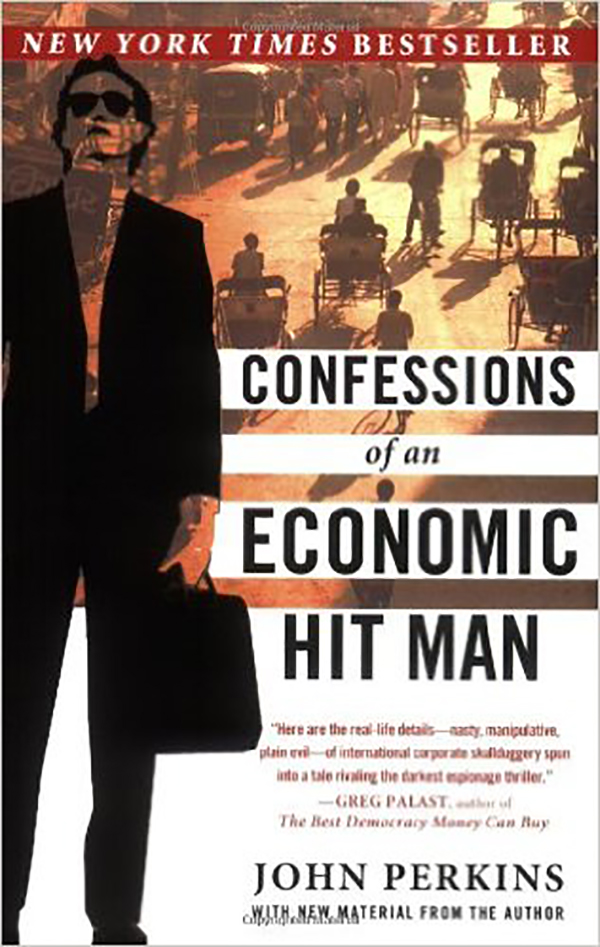Somewhere between a whistle-blowing and a confessional, this 271-page mea culpa is an autobiographical gut-spilling of an economic hit man (EHM) employed in a thirty-year-or-so career by a major international company to further the power, control and profit of the American Empire, as he describes it. As a confessional, it is a personal account of a man’s rise to power, fortune and status in a company as powerful as Haliburton and Bechtel to exploit and subjugate post-colonial weaker nations and their populations for the egregious privileges of the imperial corporatocracy, as he names it, of the United States of America. It is written on two levels: the chronicle of the imperial international dealings of rapacious capitalism, and the coming of age of consciousness and conscience of an agent of such, a belated bildungsroman.
On the first level, John Perkins recounts his dealings in Indonesia, Ecuador, Columbia, Panama, Iran and Saudi Arabia. The model is simple as established in the 1970s. To the often bribed and coerced rulers in these poor countries, the powerful capitalists present duplicitous structural economic models of major projects involving energy, agriculture and industry, designed like the rising tide to lift all, including the disenfranchised, into the modern world. Then, as the ink dries, the corporate managers through the IMF and World Bank wangle a whopping loan in mega-dollars that the target (dare I say victim?) country, the illusion having broken, can never pay back, shackling the population to an insurmountable debt that they will forever owe while the rulers satisfy themselves with whatever egregious stipends have greased their palms. At this point, the plan is a success. For the wealthy deal-makers and lenders, the unforgivable debt is the object, as Perkins describes it, for it is because of this that all public goods and services in those countries must be turned over to their financial masters to be privatised to the businesses in the lender country (USA) for repayment. Perkins accuses the USA of imperialism in blue suits. The loan/debt is not object, but method. It is this strategy to which John Perkins, posing as a major economist (which he is not), applied himself for an unconscionable number of years.
As a confessional, Perkins recounts his young life and formative years, documents his being seduced by unscrupulous entrepreneurs, and presents personal relationships. Most of all, he exposes his personal battles of conscience that he wages for almost thirty years, a fact about which any reader might reasonably ask: What took you so long? But that is one part of the story. Perkins shows us that he is not alone: there are flotillas of pirates out there doing exactly what he is doing, with very few showing signs of inner breast-beating. The rewards are plentiful and grand. He stays. However, Mr. Perkins, somehow, has been blessed with a few empathy genes that won’t leave him alone; so, after encountering the suffering in impoverished situations and pre-modern settings, engaging with them with equanimity, connecting with the natural environments and reviling slums, this patriot questions the roots of his conditions, redefines his allegiance to his country as dissent, skepticism and moral repositioning. Hence, the outcome of this deeply personal autobiography is a transformed conscience committed to constructive social relations with humanity, rather than the dollar-patriotism of the empire and personal aggrandisement.
The book, however, is not without its spots. First, anyone who has read even just a few histories of American interventions would know that too often he glides, a little too easily, past the kind of operations that such characters as John Foster Dulles, Secretary of State, and his brother Allen Dulles, Director of the CIA under the Eisenhower administration made blueprint and ongoing, not giving such actions enough weight. He certainly includes some, but claims the actions of the economic hit men were far more effective and prevalent. Who knows? It is a claim that is rash considering the bombing back to the stone age of the Arab World from 2003 to present.
This memoir is deeply personal from a man who believed fervently in the Dulles (not mentioned, oddly enough) evangelism for international liberalism. He really believes in it at the outset. However, as he comments on his past actions and these nefarious methods as a more mature man in later life, his models seem derivative of a high school civics text. His overt patriotism seems rather innocent, even cliché, in his references to some of the historical characters such as Carter, Chavez and Castro. He simply sounds a little programmed, and his mulling waffles between the profound and the superficial.
However, as the personal exposé goes, it must be ambiguous and inconsistent, for this process is a haunted human revelation as he deals with his past life for which he has an indissoluble shame. That is the book’s strength. It’s honest. As Aldous Huxley once quipped, “The only consistent man is dead.” His inconsistencies keep us rooting for his good angel when the little devil behind his ear seems to win him back. He is a believably flawed character. So, while there may be some ring around his confessional tub, I wouldn’t throw the baby out with the bath water. He’s too close to all of us, if we really do the ‘examination of conscience’ that he dares.
